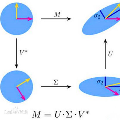We present the Continuous Empirical Cubature Method (CECM), a novel algorithm for empirically devising efficient integration rules. The CECM aims to improve existing cubature methods by producing rules that are close to the optimal, featuring far less points than the number of functions to integrate. The CECM consists on a two-stage strategy. First, a point selection strategy is applied for obtaining an initial approximation to the cubature rule, featuring as many points as functions to integrate. The second stage consists in a sparsification strategy in which, alongside the indexes and corresponding weights, the spatial coordinates of the points are also considered as design variables. The positions of the initially selected points are changed to render their associated weights to zero, and in this way, the minimum number of points is achieved. Although originally conceived within the framework of hyper-reduced order models (HROMs), we present the method's formulation in terms of generic vector-valued functions, thereby accentuating its versatility across various problem domains. To demonstrate the extensive applicability of the method, we conduct numerical validations using univariate and multivariate Lagrange polynomials. In these cases, we show the method's capacity to retrieve the optimal Gaussian rule. We also asses the method for an arbitrary exponential-sinusoidal function in a 3D domain, and finally consider an example of the application of the method to the hyperreduction of a multiscale finite element model, showcasing notable computational performance gains. A secondary contribution of the current paper is the Sequential Randomized SVD (SRSVD) approach for computing the Singular Value Decomposition (SVD) in a column-partitioned format. The SRSVD is particularly advantageous when matrix sizes approach memory limitations.
翻译:暂无翻译
相关内容
Source: Apple - iOS 8





